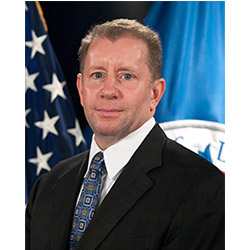A Growing Threat: The Landscape of Extremist Threats to Law Enforcement in the United States with John Cohen (Part 1)
Episode #33 | 28 September 2022
WATCH EPISODE LISTEN TO EPISODE SUBSCRIBE TO PODCAST
Domestic violent extremism has become one of the biggest threats to law enforcement and members of the public. In the past few years, individuals affiliated with anti-government and white supremacist groups have attacked houses of worship, grocery stores, demonstrations, and even law enforcement officers themselves. As a result, combating domestic violent extremism is a priority for law enforcement at every level across the country.
On this episode of the Blue View, National FOP President Patrick Yoes sits down with John Cohen, who most recently served as the Coordinator for Counterterrorism and Assistant Secretary for Counterterrorism and Threat Prevention at the U.S. Department of Homeland Security (DHS), the top counterterrorism official in the country.
John has over three decades of experience in law enforcement, counterintelligence, and homeland security, and has held numerous high-ranking government positions over his career. He has studied mass casualty attacks and is currently studying the impact of internet-based communications technologies on crime and homeland/national security.
In Part 1 of their conversation, National President Patrick Yoes and John Cohen discuss today’s threat environment, the role that social media plays in encouraging ambush attacks on law enforcement officers, how social media complicates the fight against crime, and some things that law enforcement can do better to respond to these challenges.

About John Cohen
John D. Cohen currently serves as a Senior Expert on Global Threats for the Argonne National Laboratory. He is also an on-air expert for ABC News on homeland security, terrorism, counter-intelligence, and law enforcement issues and was recently appointed as an Adjunct Professor in the Georgetown University Security Studies Program. Until recently he served as a Distinguished Professor of Professional Practice in Criminal Justice in the Rutgers University School of Arts and Sciences and Director of the University’s Center for Critical Intelligence Studies.
Cohen has over three decades of experience in law enforcement, counter-intelligence, and homeland security. Mr. Cohen has studied mass casualty attacks and is currently studying the impact of Internet-based communications technologies on crime and homeland/national security. He served as the Acting Under-Secretary for Intelligence and Analysis (I&A) and Counterterrorism Coordinator for the United States Department of Homeland Security (DHS). During his time at DHS, Mr. Cohen was a direct adviser to the Secretary and he oversaw the development and implementation of a number of high visibility Department-wide crime prevention, counterterrorism, counter-intelligence and border and transportation security initiatives. Mr. Cohen also led the Department’s efforts to establish multi-disciplinary programs focused on: countering violent extremism; preventing and responding to mass casualty/active shooter attacks; improving information sharing; and expanding DHS’ interactions and collaboration with state and local law enforcement organizations, private sector companies and faith-based organizations.
Previously Mr. Cohen served as the Senior Advisor to the Program Manager for the Information Sharing Environment, Office of the Director of National Intelligence, where he authored and coordinated the implementation of key components of the 2007 White House National Strategy for Information Sharing.
Mr. Cohen has an extensive background in homeland security and law enforcement operations and policy development. He was Senior Homeland Security Policy Advisor to a number of State and local officials including Governor Mitt Romney of the Commonwealth of Massachusetts and Janet Napolitano, Governor of the State of Arizona. In 2004 he was selected by the National Journal as one of the “100 Key People in Homeland Security.” He was also named “Law Enforcement Person of the Year,” by Law Enforcement News for his work in developing and establishing a national non-emergency number, 3-1-1. He has worked within the private sector and has held a variety of government positions including: Special Agent, Office of Naval Intelligence; Police Detective and Patrol Officer, City of Gardena, CA; Senior Investigator, House Judiciary Committee, U.S. House of Representatives; and Senior Policy Advisor to the Director, Office of National Drug Control Policy, Executive Office of the President of the United States. He is the recipient of a number of awards and commendations including the Drug Enforcement Administration “Administrator’s Award,” The South Bay “Medal of Valor,” and the Department of Homeland Security’s “Distinguish Service Medal.”






